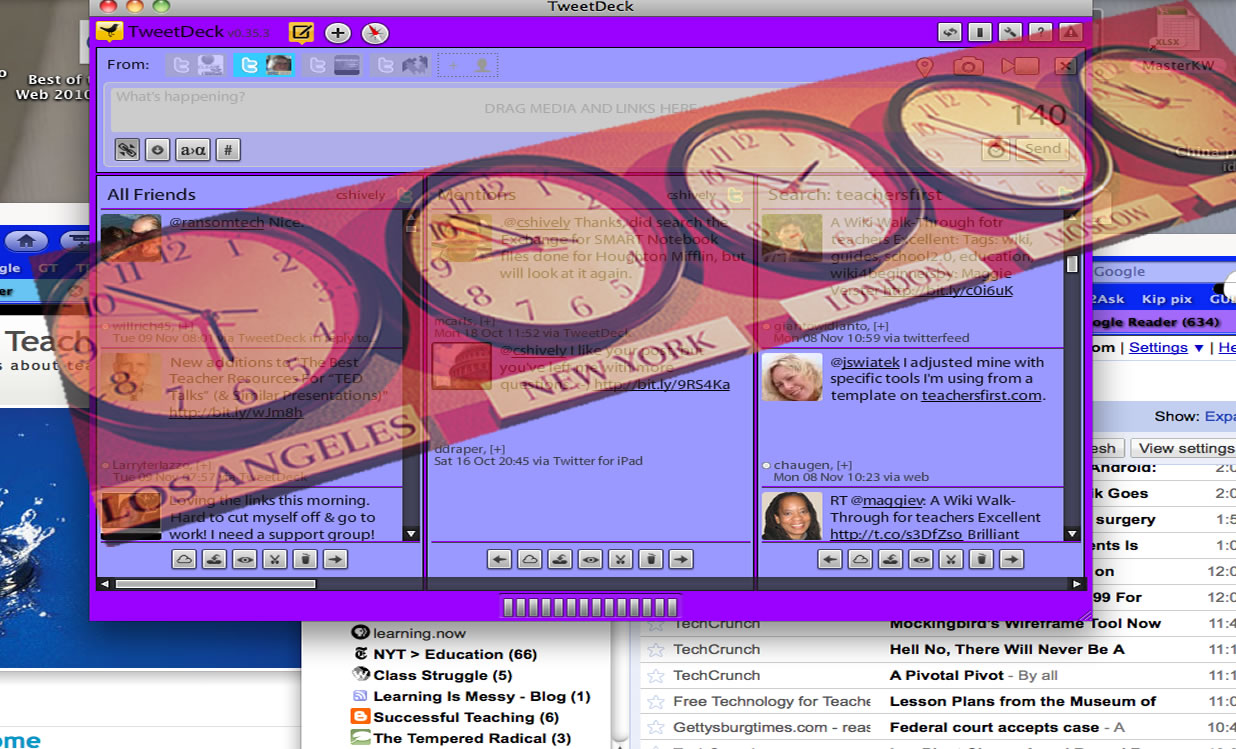Timezones, tweets, feeds, and blogs
 I began this post last week and allowed it to “sit,” thereby defying any timeliness whatsoever.
I began this post last week and allowed it to “sit,” thereby defying any timeliness whatsoever.
I just read a thoughtful– and occasionally heated– exchange on the role of time zones in fragmenting the world and as barriers to “flat,” global learning. The comment thread is fascinating and well worth a read, even if it is “old” in your time zone!
It makes me wonder: what is the value of real time interaction and, consequently, of Twitter, feeds, and blog posts for writers/artists and those who model creative process for our students? Are tweets the carefully crafted mini-poems or snippets we collect in scrapbooks for someday inspiration? Are they advertisements for audience: “I am a writer– listen to me”? Do they need immediate response? How do tweets, feeds, and blogs mesh with the creative value we put on real time interaction and what we get out of them?
So I share an enigmatic analogy of the way I envision tweets, feeds, and blogs:
Tweets are a quick walk past the shop windows of a thriving shopping district. It may be in daylight and during store hours, or it may be at night when the lights are lower and the “SALE” signs obscured by shadow. But I walk by and stop only to look at those that intrigue me. I could go back and enter the shop another time if I retrace my steps in this vast downtown, and if I want to come during store hours. As I pass by during store hours, I may stop in and speak to a shopkeeper. I may even buy something. There is no predicting. I send a message of my own to others on the sidewalks by adjusting my scarf or changing my pace, but my message is quick and without depth: surface statement for surface judgment among a busy crowd. If I do fashion a message during off hours, no one sees it.
Checking my feed reader is my extra cup of medium ultra bold coffee-of-the-day, a stop on my walk for a mental cup of coffee, take-out. I enjoy it for a few minutes (perhaps I walk back past more Tweet offerings at the same time). I savor the flavor, but I may not remember to finish the cup if I am too busy with other distractions. I may decide not to stop at all for that take-out cup today.
Writing a post is deliberate coffee-and-conversation with someone else at the cafe table. This is not take-out. This is sit-down. There is a friend or new acquaintance there with me. We may talk about what we saw in the shop windows or not. But the words of the conversation matter. A post is deliberate, though conversational. A blog post is not a full meal– like writing an article or something for “print,” but it is careful and responsive. I may linger. I may even lose track of time because the conversation is so good. If I sit down for coffee alone, I still imagine the other person across the table and word my ideas so he can hear me best.
This analogy of tweets, feeds, and blogs tells the value of how I experience each, rather than the place of each in real time. The enigma is that the timeliness value is the inverse of the relationship value. If blog posts — the experiences I value most– are cafe conversations, they should become cold, abandoned cups of coffee when another person cannot hear them at the same time. The feed reader “take out” coffee should yield stale, gray flavor when it is not fresh. And store windows should lure me most because they are there for me any time in real time. How I experience each determines its value to me, and “real time” matters the least. Real time does not matter as much as deliberate, lingering time. Time does not matter as much as attention and craft. Maybe real time and time zones do not matter when we take the time to factor full creative process into the exchange. Don’t you do a much better job of saying things when you give the process time?
I began this post last week and allowed it to “sit,” thereby defying any timeliness whatsoever.



